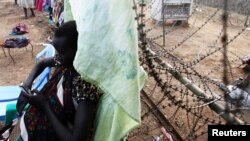The government of South Sudan has insisted repeatedly that the conflict that broke out on December 15 of last year is a political row between President Salva Kiir and his former vice president, Riek Machar.
But at a meeting of the U.N. Human Rights Council in September, a leading African official publicly challenged that view.
“Yes, the problem, the one of 15th December, started as a political disagreement in Juba, but it quickly degenerated to an ethnic conflict,” former Nigerian president Olusegun Obasanjo said in a speech to the U.N. Human Rights Council in September.
Obasanjo heads an African Union Commission of Inquiry probing human rights abuses in South Sudan. He and members of his team have traveled in South Sudan and talked to many people in their investigations.
Ordinary South Sudanese have said since last December that they were attacked in Juba in the days immediately following the start of the conflict. Many said they believe they were targeted because of their ethnicity.
Soon after the uprising began, the violence spread to Jonglei, Upper Nile and Unity states where ethnic killings reportedly happened on a much larger scale as government troops and rebels loyal to Machar fought for territory in the three states.
Attacks in Bentiu, Bor
In April, hundreds of civilians were killed in Bentiu, the capital of Unity state, when rebels loyal to Machar captured the town. Civilians were killed in places of worship, in their sickbeds and the streets. The United Nations quickly blamed the rebels for what some called a massacre.
Days after the Bentiu attacks, an armed mob attacked the U.N. protection of civilians site in Bor, the capital of Jonglei state, and opened fire on civilians sheltering inside. U.N. officials said that attack was carried out by pro-government youths who were angered by the fact that some of the people in the camp had celebrated the take-over of Bentiu by rebel forces.
U.N. Secretary-General Ban Ki-moon called the attack on the base in Bor a war crime.
Spiralling out of control
A week after that attack, said Daniel Bekele, Africa director at Human Rights Watch, warned that "... ethnically motivated brutality against civilians is spiraling out of control.”
In October, U.N. Special Representative for Sexual Violence in Conflict Zainab Bangura said at the end of a visit to South Sudan that women and children have been bearing the brunt of the fighting.
Bangura, who spent a week travelling around the country, said that what she heard from survivors and saw with her own eyes in South Sudan was the worst violence she has seen in her 30-year career.
'Unimaginable pain'
“Survivors feel they have no one to turn to, to report the crimes that have been committed against them," she told a news conference. "The character of sexual violence crimes is shocking. In the words of one woman activist I spoke to, it is not just about rape. It is to inflict unimaginable pain and destruction.”
Elizabeth Deng, a South Sudan researcher for Amnesty International, said some of the gender-based violence committed during South Sudan's year-long crisis is gruesome beyond words.
“We documented a number of cases of sexual violence including gang rape, brutal acts such as cutting open pregnant women or raping women with objects like sticks,” Deng said.
Kumar said the atrocities that have been committed in South Sudan are the result of a lack of accountability and a sense of impunity that is shared by perpetrators of the acts of violence. They come from both sides of the conflict, she and other South Sudan observers, said.
Although an official death toll has never been released for the conflict, U.N. officials said at least 10,000 people have been killed. Another two million have been displaced by the conflict, and around 200,000 are sheltering in U.N. camps. Many of the displaced say they fear they will be targeted for their ethnicity if they return to their homes.






